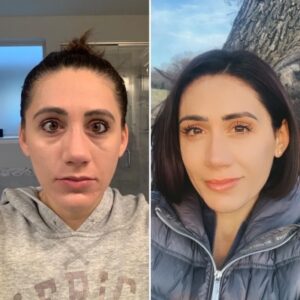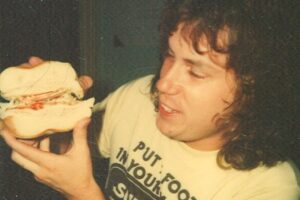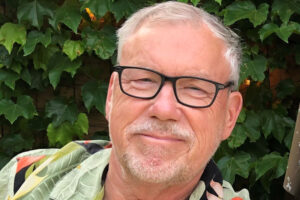Recovery in the Workplace: Perspectives From Pros
Ending the stigma often associated with addiction and recovery

For millions of Americans, getting sober is a necessary and life-changing decision. The positive changes derived from sobriety can even extend into the workplace.
However, the topics of addiction and recovery remain taboo in many work environments. One of our goals at All Sober is to normalize these conversations. By doing so, we hope to reduce the stigma often associated with addiction and recovery, and help people realize they’re not alone.
We spoke with several people who found their greatest professional success after getting sober, either through an upward trajectory in their chosen field or becoming inspired to pursue a new career path. Check out their thoughts on recovery in the workplace and how getting sober has been essential to their success.
Sarah Bateman
“Let’s have a long overdue work conversation.”
 My name is Sarah Bateman. Some of you may know me for the various leadership roles I’ve held. But what most you of you don’t know is that for most of my professional life I have been a very high-functioning alcoholic. Like many, my work defined me during the day and a bottle helped me manage through the night. While the two never directly interfered with each other, my very existence depended on them both.
My name is Sarah Bateman. Some of you may know me for the various leadership roles I’ve held. But what most you of you don’t know is that for most of my professional life I have been a very high-functioning alcoholic. Like many, my work defined me during the day and a bottle helped me manage through the night. While the two never directly interfered with each other, my very existence depended on them both.
I’m very happy to report I’m living an incredible life of recovery today and happy to share my story with anyone it might help — but this post isn’t just about me. The reality is, most of us will work with someone who is battling addiction. Nearly 60% of the U.S. population is affected either directly or indirectly by drug and alcohol addiction. That’s six out of 10 people on any given team. Take a moment to think about the size of your organization.
People are our most precious product, yet the workplace is one of the most difficult places to talk about this. But we, collectively, have the power to change that and make it our most powerful tool to drive real change and influence in society.
Share your story. It can help remove the stigma around addiction, lift people up and show them that recovery is possible. It can help show employers across the country that promoting workforce health, both mental and physical, must be a top priority.
Let’s make this conversation normal.
Tommy Heffernan
“Today marks my two-year anniversary of getting sober.”
 I made three calls to my employer before I went to treatment. The first was to my CRO, who was kind and simply said he wanted me to get better, and that my job was safe.
I made three calls to my employer before I went to treatment. The first was to my CRO, who was kind and simply said he wanted me to get better, and that my job was safe.
The next two calls were to my VP and director and they were heartbroken. The global head of HR cried on the phone because she felt helpless and sad for what I was going through. I wasn’t expecting to have any of these experiences with them. In a moment when I was terrified to expose myself, they showed me that we were humans before we were colleagues.
This company is a model organization for how to handle and support someone looking to seek treatment. Yet there was never anything publicly relayed to employees that this would have been the reaction. This isn’t a jab to my previous employer; in fact, it’s quite the opposite. But why?
Companies are happy to state in job descriptions that they have a matching 401K or unlimited PTO, but why not talk about having a fantastic structure and process for those in need of substance abuse and mental health treatment and support? If that isn’t mentioned, the stigma still lives. We need more organizations to step up and be vocal about that.
Having supportive management didn’t change the fact that there was a lot of anxiety in reentering the workforce. What if my clients found out that I was in treatment or running Zoom calls from a halfway house? It took several months before I was comfortable talking about where I’d been for the past 84 days.
The person who made it comfortable is a guy who works at Salesforce and has 15-plus years of sobriety under his belt. He’s very vocal on LinkedIn about it. I saw one of his posts and reached out to him. I told him that while he didn’t know me, he also didn’t know that his voice and courage on LinkedIn regarding recovery and the stigmas behind it helped me find my voice.
It changed my life because I’m now empowered to share my story. I hope to have the same impact, unknowingly, on someone else who sees my post.
Louise Barnett
“My sobriety is a byproduct of my tiny habits.”
 For 20 years, I worked in the hospitality sales world of client entertainment, where drinking culture is pervasive. Among many things, travel and entertainment were decimated when COVID hit, which became a huge part of my struggle. It forced me to realize I wasn’t drinking for fun or celebration or just because it was part of entertaining. I was drinking alone to numb, mask and hide all of my feelings.
For 20 years, I worked in the hospitality sales world of client entertainment, where drinking culture is pervasive. Among many things, travel and entertainment were decimated when COVID hit, which became a huge part of my struggle. It forced me to realize I wasn’t drinking for fun or celebration or just because it was part of entertaining. I was drinking alone to numb, mask and hide all of my feelings.
A lot of people start with that ultimate goal of sobriety. My journey didn’t start with a goal. My journey didn’t start with a destination. My journey started with a deep desire for something more. I had absolutely NO idea what I wanted or where I was going but I knew I felt empty, lost, alone, scared and broken.
Not knowing where it would lead me, I dipped my toes into the self-development world. One of the first quotes I heard in a podcast was, “Is what you are doing in this moment getting you closer to your goals?” It immediately resonated with me. I couldn’t stop thinking about it and every time I had the urge to drink, I asked myself, “Is this getting me closer to my goals?” The answer was ALWAYS a resounding NO!!!
This was my catalyst to change. From that moment, I drowned myself in self-development. I started creating morning routines as simple as setting my alarm clock back by five minutes! I implemented tiny habits as small as a simple high-five in the mirror, and as a result, slowly started cutting back on my drinking. It simply wasn’t a focal point for me anymore. Eventually, I was able to look in the rearview mirror and couldn’t believe what I had already accomplished … imagine what I could do sober!
I started my own life and professional development coaching company this year called Y.O.U. By Design. My sobriety allowed me to identify my strengths and passions, which enabled me to uncover my purpose. The work I do now in helping others become the best version of themselves is part of my own recovery.
I work with individuals who are struggling with some kind of dark secret and desire for change. Ninety percent of my clients have some sort of relationship with addiction, either personally or with a family member. I’m a big believer in authentic self and the law of attraction, so I want to attract clients with whom my story resonates in some way.
I’m an all-or-nothing type of person. I dive into anything that I do 200%, alcohol included! Now I’m diving into sobriety 200%.
Join the change movement! We want you to share your story of recovery and professional success with the All Sober community. Email mccarton.ackerman@allsober.com to get involved.
More Relaunch
Subs & Drugs & Rock & Roll, Part 3: 'I'm a Loser (And I'm Not What I Appear To Be)'
Don Fertman reaches bottom as the jelly donut hits the wall. The latest installment of the longtime Subway exec's memoir.
Subs & Drugs & Rock & Roll, Part 2: A Day in the Life
Don Fertman woke up one morning 40 years ago and poured himself a drink, as usual. But the future Subway exec didn't know this day would be far from ordinary.
Subs & Drugs & Rock & Roll, Part 1: With a Little Help From My Friends
Don Fertman, longtime Subway exec, writes about a pivotal moment in his 40 years of sobriety: what happened after he went public about his recovery on "Undercover Boss."
Here's How To Make the Office Holiday Party Recovery-Friendly
Four ways to make your holiday party more inviting to employees who are in recovery, according to the Society for Human Resource Management.
How Can I Be a Sober Ally in the Workplace?
You're not in addiction recovery, but you want to show up for people who are. Great! Here's what that looks like at the office.
Is Alcohol Big in Your Work Culture? Here's How To Sidestep — Or Talk About It
The "Mad Men" era may be over, but some workplaces can still be particularly challenging in recovery. Some pointers on putting your sobriety first.
Your Guide To Hanging Out and Making Friends in College — Sober
Doing college sans drugs and alcohol doesn't have to be a struggle. Some tips on making bonds that'll last and having a blast.
The Benefits of a Recovery-Friendly Workplace
Also called a "recovery-ready workplace," it's a winning proposition for high-quality employers and employees alike.











